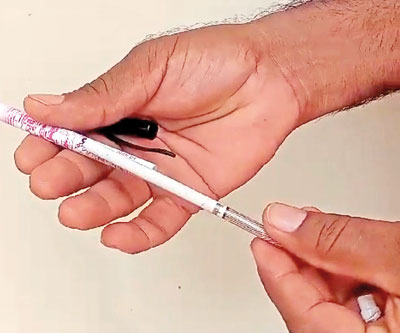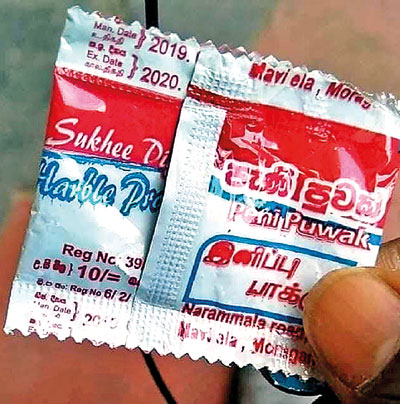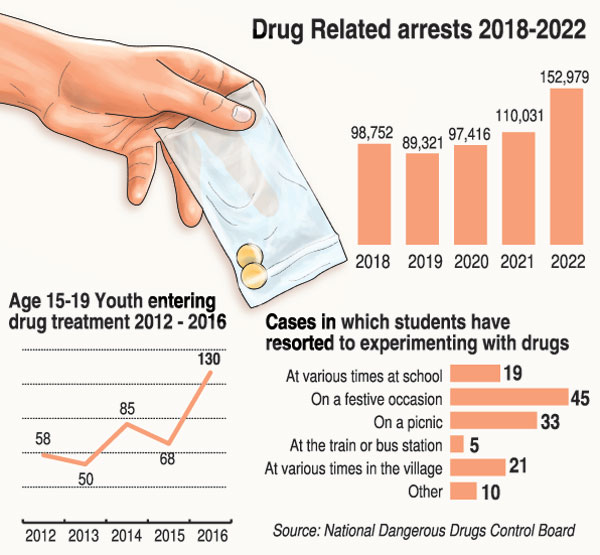News
Some schools struggle to intercept drugs
View(s):By Kasun Warakapitiya and S. Rubatheesan
During busy school days, a pharmacy located near a school in the Galenbindunuwewa division of Anuradhapura was frequently visited by school-uniformed students.
A police undercover officer was able to figure out what attracted students to visit the place. The pharmacist was selling strong painkiller tablets, which are often prescribed for critically ill people.

Cigarettes are smuggled into schools via means of pens. (Pictures from awareness programmes carried out by NDDCB in various schools recently)
A pharmacy owner from Galenbindunuwewa was taken into custody by police and later remanded until November 22 after being produced in court this week. Police investigations revealed students from neighbouring villages in Kahatagasdigiliya, Madawachchiya, and Nocchiyagama in Anuradhapura were targeted by the pharmacies online and offline.
He had been arrested under similar charges in recent years and fined, and as the court directed at that time, he had to make a public apology through newspapers and assure he wouldn’t engage in such activities.
A senior official of the Anuradhapura zonal education department told the Sunday Times, under the condition of anonymity, that they were aware that drug use was prevalent in some schools but lacked information on specific individual cases. “We carried out several awareness programmes in these areas to educate students against drug use and its impact.’’
Recalling a recent meeting called by the secretary to the Education Ministry on measures to deter drug use among school students, the senior official said several schools in the city limits and suburbs had been infiltrated with drugs and various drug-mixed areca nut products.
“We don’t know where the drugs come from or how students purchase them, but there were cases where children were found to be possessing drugs, painkillers, and substances,” the official said, explaining steps taken by principals and teachers against the students that could not prevent the drug peddling routes.
A recent report from a committee appointed by the Education Ministry to study and recommend Sri Lankan principal services also pointed out how school officials are powerless to act when it comes to increasing drug use and other illegal activities.

Drug substance mixed arecanut - mava/ pavul/ pampara packets
“The social environment of schools is increasingly characterised by the illegal operations of drug dealers, organised crime, and organisers of business operations targeting school children. Setting up a strong barrier around school and fighting against intruders are tasks that require special preparation by school principals who are required to coordinate with providers of law and order,” stressed the committee headed by Prof. Gunapala Nanayakkara, an adviser to the Ministry of Education.
Following the incident, Anuradhapura District Secretary Janaka Jayasundara directed senior police officers to take urgent steps to ensure that the school environment is drug-free and to act against those selling painkillers and peddling drugs. Child protection officials and divisional secretariats have been instructed to carry out awareness campaigns.
An NDCCB study on drug use among school students in 2016 found that at least 16% used drugs at least once, while 6% were regular users, from a sample of 5,075 students from 100 schools in 12 districts.
Most often, students use cigarettes, alcohol, beer, tobacco, and drug substances mixed with chewing products. The report also pointed out that many students got introduced to drugs due to peer pressure, parental influence, and their social environment.
Based on studies by the National Dangerous Drugs Control Board (NDDCB), a significant number of students from Grade 6 up to the Ordinary Level were found to be using drug-mixed chewing substances such as Pampara, Babul, Mava, etc. in addition to smoking and using illegal tablets, while students from Grade 11 onwards had access to cannabis and methamphetamine known as ‘ice’.
“In recent times, we have noticed that pharmaceutical tablets also came into use among students online and offline, carried out by drug peddlers,” chairman of NDDCB Shakya Nanayakkara told the Sunday Times.

Mr. Nanayakkara said there has been a new trend of one-to-one marketing tactics adopted by the drug mafia from the alcohol and tobacco industries to peddle drugs through agents within the schools. “If a school student becomes an agent of drug peddlers, he would be encouraged to target affluent and vulnerable students, and the cycle goes on.”
To prevent drug use among school students, he proposed that authorities should engage in reducing supply and demand. “Currently, we are engaged in the latter—demand reduction—by carrying out at least 250 awareness campaigns in schools every month across the country, educating the students on the negative impacts of drug use.”
However, Mr. Nanayakkara stressed that supply reduction is critical.
| Teachers want prevention, not drug unit | |
| The social intelligence unit initiative by the Defence Ministry to combat drug substance abuse among school children will consist of cadet corps, teachers and principals. Defence State Minister Premitha Bandara Tennakoon told the Sunday Times that the unit will be tasked with gathering information on drug peddlers within the school system and incidents of child abuse as well. The unit will operate effect from January. “The unit will be able to gather, and verify information and will take appropriate actions to prevent such activities. Follow-up actions and review progress will be monitored accordingly,” Mr Tennakoon told the Sunday Times. However, teachers’ unions expressed concerns while reiterating that authorities should focus on preventing drugs from being smuggled into schools. Joseph Stalin, the general secretary Ceylon Teachers Union, pointed out that there is no use in carrying out search operations in schools since drugs could have already reached the school environment. “Carrying out bag or body searches within the school environment can be counterproductive as well since it would be time-consuming and it can be used for engaging in learning activities. I propose the authorities set up a system to prevent drugs reaching the schools. This should take place outside of the schools and target persons, shops as well as groups who distribute and peddle drugs among school children.’’ |
The best way to say that you found the home of your dreams is by finding it on Hitad.lk. We have listings for apartments for sale or rent in Sri Lanka, no matter what locale you're looking for! Whether you live in Colombo, Galle, Kandy, Matara, Jaffna and more - we've got them all!

